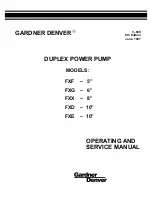
17
(2)
The operation of input box is the same as
Independent mode
.
In the same way, press the
blue
Volt/CV
or
Curr/CC
key to set the
Positive
output
voltage/current.
Note
: If the input value exceeds the maximum rating, the box prompts “ERROR”; you
need to input another value within the rated range.
5.3
Over Voltage/Current Protection
When the Over Voltage Protection (O.V.P) or Over Current Protection (O.C.P) is enabled,
once the output voltage/current reaches the set value of O.V.P/O.C.P, the instrument will
cut off the output. The value of O.V.P/O.C.P which causes cutting off will turn red and
flashing; the instrument will make a buzzing sound if the buzzer is turned on.
Note
:
When the instrument disables the output due to protection, after you make some
adjustments, the channel must be restarted to output normally.
This function can keep the power output from exceeding the load rating in order to protect
the load. The O.V.P/O.C.P can be set separately for the four working mode and for
different status (normal, timer). You can enable or disable these functions as required.
The parameters of the O.V.P/O.C.P set in normal status take effect in normal status. The
parameters of the O.V.P/O.C.P set in timer status take effect in timer status.
Note
:
In Plus-minus mode, if either of the Positive or Negative output voltage/current reaches its
own O.V.P/O.C.P, the instrument will disable the output.
5.3.1
Set O.V.P
(1)
Enter the O.V.P setting menu:
Independent Mode
Press the
System
key, enter [
System
→
CH1 (CH2)
→
O.V.P
].
Parallel, Series Mode
Press the
System
key, in normal status, enter [
System
→
O.V.P
];
in timer status, enter [
System
→
Pro Set
→
O.V.P
].
Plus-minus Mode
Press the
System
key, enter [
System
→
Positive (Negative)
→
O.V.P
].
(2)
A setting box pops up, press the
▲
/
▼
key
to switch the state of the O.V.P between
“ON” or “OFF”, the O.V.P in current mode and status is enabled or disabled.












































